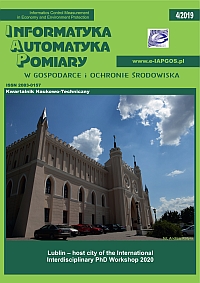THE CONCEPT OF A FLYING ELECTROMAGNETIC FIELD MEASURING PLATFORM
Article Sidebar
Issue Vol. 9 No. 4 (2019)
-
CONCEPT OF A SELF-LEARNING WORKPLACE CELL FOR WORKER ASSISTANCE WHILE COLLABORATION WITH A ROBOT WITHIN THE SELF-ADAPTING-PRODUCTION-PLANNING-SYSTEM
Johanna Ender, Jan Cetric Wagner, Georg Kunert, Fang Bin Guo, Roland Larek, Thorsten Pawletta4-9
-
DATA-BASED PREDICTION OF SOOT EMISSIONS FOR TRANSIENT ENGINE OPERATION
Michele Schaub10-13
-
APPLICATION OF THE LENNARD-JONES POTENTIAL IN MODELLING ROBOT MOTION
Piotr Wójcicki, Tomasz Zientarski14-17
-
APPLICATION OF ARTIFICIAL NEURAL NETWORK IN THE PROCESS OF SELECTION OF ORGANIC COATINGS
Artur Popko, Konrad Gauda18-21
-
APPLICATION OF OPTICAL PROFILOMETRY IN THE ANALYSIS OF THE DESTRUCTION PROCESS OF RENOVATION ORGANIC COATINGS FOR THE AUTOMOTIVE INDUSTRY
Konrad Gauda, Kamil Pasierbiewicz22-25
-
ANALYSIS OF DATA FROM MEASURING SENSORS FOR PREDICTION IN PRODUCTION PROCESS CONTROL SYSTEMS
Tomasz Rymarczyk, Bartek Przysucha, Marcin Kowalski, Piotr Bednarczuk26-29
-
MEASUREMENT OF TWO-PHASE GAS-LIQUID FLOW USING STANDARD AND SLOTTED ORIFICE
Barbara Tomaszewska-Wach, Mariusz R. Rząsa, Marcin Majer30-33
-
DETERMINATION OF YOUNG’S DYNAMIC MODULUS OF POLYMER MATERIALS BY RESONANCE VIBRATING-REED METHOD
Volodymyr Mashchenko, Valentine Krivtsov, Volodymyr Kvasnikov, Volodymyr Drevetskiy34-37
-
DETERMINATION OF THE OPTIMAL SCANNING STEP FOR EVALUATION OF IMAGE RECONSTRUCTION QUALITY IN MAGNETOACOUSTIC TOMOGRAPHY WITH MAGNETIC INDUCTION
Adam Ryszard Zywica, Marcin Ziolkowski38-42
-
CONSTRUCTION OF AN ULTRASONIC TOMOGRAPH FOR ANALYSIS OF TECHNOLOGICAL PROCESSES IN THE FIELD OF REFLECTION AND TRANSMISSION WAVES
Tomasz Rymarczyk, Michał Gołąbek, Piotr Lesiak, Andrzej Marciniak, Mirosław Guzik43-47
-
A NEW CONCEPT OF DISCRETIZATION MODEL FOR IMAGING IMPROVING IN ULTRASOUND TRANSMISSION TOMOGRAPHY
Tomasz Rymarczyk, Krzysztof Polakowski, Jan Sikora48-51
-
EVALUATION OF THE ELECTRICAL CAPACITANCE TOMOGRAPHY SYSTEM FOR MEASUREMENT USING 3D SENSOR
Jacek Kryszyn, Damian Wanta, Waldemar T. Smolik52-59
-
USING 3D PRINTING TECHNOLOGY TO FULL-SCALE SIMULATION OF THE UPPER RESPIRATORY TRACT
Oleg Avrunin, Yana Nosova, Ibrahim Younouss Abdelhamid, Oleksandr Gryshkov, Birgit Glasmacher60-63
-
CONCEPT AND REALIZATION OF BACKPACK-TYPE SYSTEM FOR MULTICHANNEL ELECTROPHYSIOLOGY IN FREELY BEHAVING RODENTS
Olga Chaikovska, Oleksandr Ponomarenko, Olexandr Dovgan, Igor Rokunets, Sergii Pavlov, Olena Kryvoviaz, Oleg Vlasenko64-68
-
ATRIAL FIBRILLATION DETECTION ON ELECTROCARDIOGRAMS WITH CONVOLUTIONAL NEURAL NETWORKS
Viktor Kifer, Natalia Zagorodna, Olena Hevko69-73
-
THE CONCEPT OF A FLYING ELECTROMAGNETIC FIELD MEASURING PLATFORM
Sławomir Szymaniec, Sławomir Szymocha, Łukasz Miszuda74-77
-
LOW COST SOLAR THERMOELECTRIC WATER FLOATING DEVICE TO SUPPLY MEASUREMENT PLATFORM
Andrzej Nowrot, Monika Mikołajczyk, Anna Manowska, Joachim Pielot, Antoni Wojaczek78-82
-
IMPROVING THE DYNAMICS OF AN INVERTER-BASED PV GENERATOR DURING LOAD DUMPS
Łukasz Kwaśny83-86
-
MEASUREMENT SYSTEMS FOR THE ENERGY PRODUCED BY THE PHOTOVOLTAIC SYSTEM AND CONSUMED BY THE BUILDING OF THE LUBLIN SCIENCE AND TECHNOLOGY PARK
Arkadiusz Małek87-92
-
DESIGN, CONSTRUCTION AND AUTOMATIC CONTROL SYSTEM OF SINGLE-STAGE SIX-BED ADSORPTION HEAT PUMP
Katarzyna Zwarycz-Makles, Sławomir Jaszczak93-98
Archives
-
Vol. 11 No. 4
2021-12-20 15
-
Vol. 11 No. 3
2021-09-30 10
-
Vol. 11 No. 2
2021-06-30 11
-
Vol. 11 No. 1
2021-03-31 14
-
Vol. 10 No. 4
2020-12-20 16
-
Vol. 10 No. 3
2020-09-30 22
-
Vol. 10 No. 2
2020-06-30 16
-
Vol. 10 No. 1
2020-03-30 19
-
Vol. 9 No. 4
2019-12-16 20
-
Vol. 9 No. 3
2019-09-26 20
-
Vol. 9 No. 2
2019-06-21 16
-
Vol. 9 No. 1
2019-03-03 13
-
Vol. 8 No. 4
2018-12-16 16
-
Vol. 8 No. 3
2018-09-25 16
-
Vol. 8 No. 2
2018-05-30 18
-
Vol. 8 No. 1
2018-02-28 18
-
Vol. 7 No. 4
2017-12-21 23
-
Vol. 7 No. 3
2017-09-30 24
-
Vol. 7 No. 2
2017-06-30 27
-
Vol. 7 No. 1
2017-03-03 33
Main Article Content
DOI
Authors
slawomir.szymocha@doktorant.po.edu.pl
Abstract
Nowadays, humans are surrounded by more and more devices that artificially generate an electromagnetic field. According to law, supervision of the level of the electromagnetic field requires specific measurements. Measurement performed by traditional methods have several limitations, which come from the infrastructure and time taken to perform the measurement. New methods of measurement are being developed in order to execute the research relatively quickly and repeatedly without any limitations. One of the methods is to use a flying mobile measurement platform.
Keywords:
References
Beni G., Wang J.: Swarm Intelligence. Proceedings of the Seventh Annual Meeting of the Robotic Society of Japan, 425–428, 1989.
Butlewski R., Kasprzyk R.: Pole elektromagnetyczne jako czynnik szkodliwy w przemysle elektroenergetycznym. Zeszyty Naukowe Politechniki Poznańskiej. Organizacja i Zarządzanie 59, 19–23, 2013.
Dyrektywa Parlamentu Europejskiego i Rady Europy 2013/35/UE z dnia 26 czerwca 2013 r. (available: 20.06.2019).
Eberhart R., Kennedy J.: Particle swarm optimization. Proceedings of the International Conference on Neural Network, 1942–1948, 1995.
Fritzel T., Strauß R., Steiner H., Eisner C., Eibert T.: Introduction into an UAV-based near-field system for in-situ and large-scale antenna measurements. 2016 IEEE Conference on Antenna Measurements & Applications (CAMA), 2016, 1–3, [DOI: 10.1109/CAMA.2016.7815762]. DOI: https://doi.org/10.1109/CAMA.2016.7815762
Gruber J., Jóźwiak I., Kowalczyk D.: Metody odzyskiwania i kasowania danych z nośników magnetycznych i nośników pamięci flash. Zeszyty Naukowe Politechniki Śląskiej. Organizacja i Zarządzanie 74, 2014, 35–44.
Gryz K., Karpowicz J.: Zasady oceny zagrożeń elektromagnetycznych związanych z występowaniem prądów indukowanych i kontaktowych. Podstawy i Metody Oceny Środowiska Pracy 4(58), 2008, 137–171.
Lewicka M. Dziedziczak-Buczyńska M. Buczyński A.: Electromagnetic radiation influence on living organisms. Polish Hyperbaric Research 4(25), 2008, 33–41.
Tomczykowski J.: Sieci energetyczne pięciu największych operatorów. Energia Elektryczna 5/2015, 23–25.
Norma Ochrona pracy w polach i promieniowaniu elektromagnetycznym o częstotliwości od 0 Hz do 300 GHz: PN-T-06580:2002
http://archiwum.ciop.pl/26003.html (available: 3.03.2018).
http://www.opole.pios.gov.pl/wms/Pliki/2017/Ocena_wynikow_pomiarow_monitoringowych_PEM_za_rok_2016.pdf (available: 21.02.2018).
http://www.wavecontrol.com/rfsafety/en/ (available: 16.05.2018).
http://www.who.int/mediacentre/factsheets/fs193/en/ (available: 10.04.2018).
http://www.wios.lodz.pl/Monitoring_promieniowania_elektromagnetycznego_PEM,38 (available: 20.04.2018).
https://pem.itl.waw.pl/artyku%C5%82y/pomiary-pem-w-otoczeniu-stacji-bazowych-telefonii-kom%C3%B3rkowej-sbtk-oraz-punkt%C3%B3w-dost%C4%99pu-lokalnych-sieci-dost%C4%99pu-bezprzewodowego-rlan/ (available: 1.07.2018).
https://tech.nikkeibp.co.jp/dm/atclen/news_en/15mk/010401054/?ST=msbe&P=3 (available: 20.06.2019).
https://www.aspen-electronics.com/wcrange.html(available: 10.04.2018).
https://www.piit.org.pl/wazne/pem (available: 10.05.2018).
https://www.riseabove.com.au/powerline-power-tether-system-for-drones (available: 20.06.2019).
https://www.wavecontrol.com/rfsafety/images/datasheets/en/cMonitEM _Datasheet_EN.pdf (available: 20.06.2019).
Article Details
Abstract views: 432
License

This work is licensed under a Creative Commons Attribution-ShareAlike 4.0 International License.






